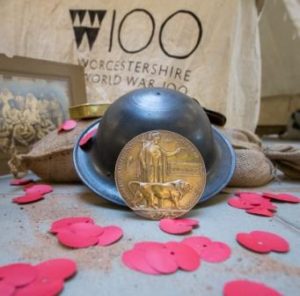Part of the Worcestershire World War One Hundred programme.
The George Marshall Medical Museum and The Infirmary are joining forces with the Worcestershire World War One Hundred programme to present a series of free talks on Armistice Day, Saturday 11th November, exploring the impact the First World War had on medicine across the County.
 Funded by the Heritage Lottery Fund the Worcestershire World War One Hundred team are also keen to hear from people across the county who are willing to share their ancestors’ experiences and memorabilia from World War One for inclusion in a County wide exhibition, the People’s Collection, planned for 2018. Visit the website to find out more on how to submit your stories.
Funded by the Heritage Lottery Fund the Worcestershire World War One Hundred team are also keen to hear from people across the county who are willing to share their ancestors’ experiences and memorabilia from World War One for inclusion in a County wide exhibition, the People’s Collection, planned for 2018. Visit the website to find out more on how to submit your stories.
On 11 November from 1pm–3.30pm visitors will hear about three medical areas that impacted the County with talks by experts in their fields, suitable for all ages, covering the following:
Dr Emily Mayhew – “Stretcher bearer, stretcher bearer,” was a common cry on the battlefields and is brought to attention in Mayhew’s book Wounded, the story of a journey: from injury on the battlefield to recovery in Britain. It is the story of the soldiers themselves, from the aid post in the trenches to the casualty clearing station in the rear, from the base hospital to the ambulance train returning them to Blighty. But it is also the story of those who cared for them – stretcher bearers and medical officers, surgeons and chaplains, nurses and ambulance drivers.
Dr Rebecca Wynter – Investigates the first female Resident Medical Officer at Worcester Infirmary, Dr Martha Stewart. Appointed in 1915, hear how difficult the post of Resident Medical Officer was with Martha carrying out the orders of senior staff, managing the medical work, and doing morning ward rounds. She was also on-call 24 hours a day at a hospital where patient numbers had increased to over 100, as fifty beds had been offered for the use of the War Office.
Dr Alice Brumby – Presents research on how conflict impacted on medical developments in Worcestershire and beyond during the First World War. Hear about the impact this industrial war had on the soldiers creating terrible injuries and wounds and how medical men both at the front and at home had to find new ways of dealing with these new problems on a larger scale than ever before as well as the long term implications for disabled soldiers after the war.
Dr Adrian Gregson, Worcestershire World War One Hundred Project Manager said: “Worcestershire played an important role in medical developments during World War One both in terms of those working in medicine but also those who benefitted from these new techniques. I look forward to hearing more from our expert speakers on Armistice Day. Visitors on the day can also join us as The Hive falls silent at 11am for their own remembrance as well as take the opportunity to visit our World War One Bell Tent to find out more about how the Great War affected Worcestershire.”
The Hive will fall silent at 11am to remember the fallen. The silence will be marked by poppies falling inside The Hive from floor 3 on to the World War One Hundred Bell Tent which will be pitched inside the building.
Discover History will take up residence inside The Bell Tent throughout Saturday 11th November to bring World War One to life and talk to visitors about the impact the Great War had across Worcestershire.
Tickets are free for the talks but should be booked in advance via: www.bit.ly/TheInfirmaryTickets For further information on events and activities visit www.ww1worcestershire.co.uk
Pics: Chris Dobbs.


